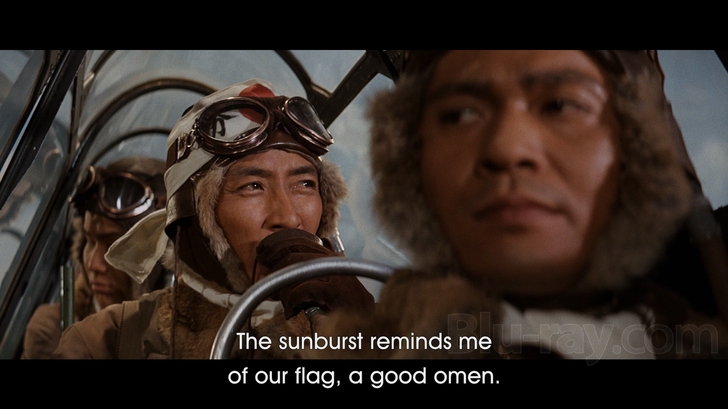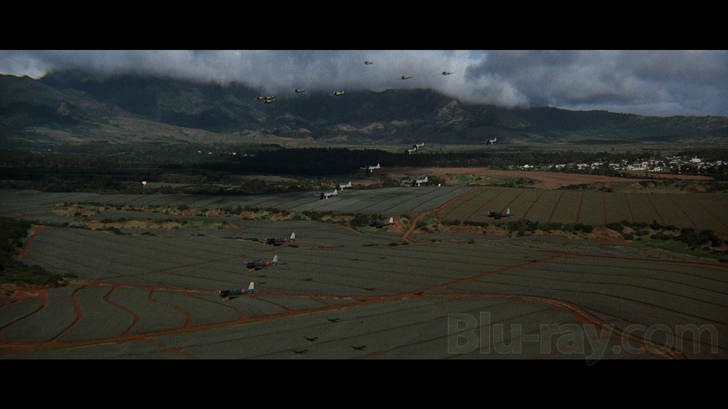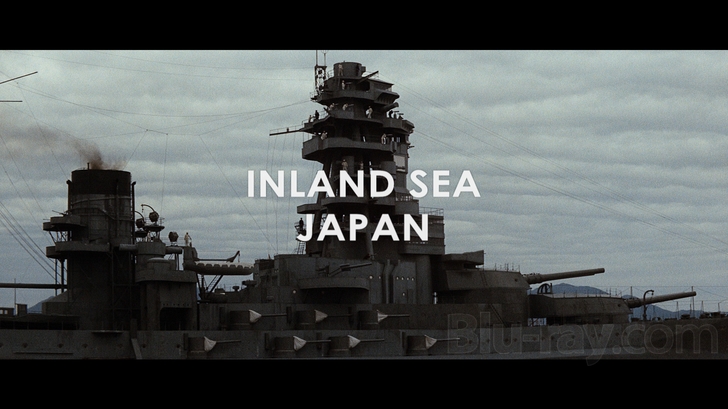Tora! Tora! Tora! Blu-ray Movie
HomeTora! Tora! Tora! Blu-ray Movie 
20th Century Fox | 1970 | 1 Movie, 2 Cuts | 149 min | Rated G | Dec 06, 2011Movie rating
7.8 | / 10 |
Blu-ray rating
| Users | 4.3 | |
| Reviewer | 4.0 | |
| Overall | 4.3 |
Overview
Tora! Tora! Tora! (1970)
The story of the Dec. 7, 1941, attack on Pearl Harbor is told from U.S. and Japanese viewpoints.
Starring: Martin Balsam, Sô Yamamura, Sô Yamamura, Joseph Cotten, Tatsuya MihashiDirector: Richard Fleischer, Kinji Fukasaku, Toshio Masuda (I)
| War | Uncertain |
| History | Uncertain |
| Drama | Uncertain |
| Adventure | Uncertain |
| Action | Uncertain |
Specifications
Video
Video codec: MPEG-4 AVC
Video resolution: 1080p
Aspect ratio: 2.35:1
Original aspect ratio: 2.35:1
Audio
English: DTS-HD Master Audio 5.1 (48kHz, 24-bit)
English: Dolby Digital 4.0 (Original)
Spanish: Dolby Digital 5.1 (448 kbps)
French: Dolby Digital 5.1 (448 kbps)
Portuguese: Dolby Digital 5.1 (448 kbps)
Japanese: DTS 5.1
Japanese track is hidden
Subtitles
English SDH, French, Japanese, Portuguese, Spanish, Korean, Mandarin (Simplified), Mandarin (Traditional), Thai
Discs
50GB Blu-ray Disc
Single disc (1 BD)
Playback
Region free
Review
Rating summary
| Movie | 3.5 | |
| Video | 5.0 | |
| Audio | 4.0 | |
| Extras | 3.5 | |
| Overall | 4.0 |
Tora! Tora! Tora! Blu-ray Movie Review
Remember, remember, the seventh of December.
Reviewed by Casey Broadwater December 9, 2011Seventy years on, December 7th is still remembered with flags flown at half-mast and re-runs of History Channel documentaries, but the date hardly seems to live in utter infamy anymore, as President Roosevelt suggested it always would. Time has healed that particular wound—the surprise Japanese bombing of Pearl Harbor, the third deadliest day in U.S. history—and it’s recalled now not with patriotic anger, but with historical curiosity about the hows and whys of the sneak attack. This sense of tempered objectivity isn’t new; any ruffles over the Pearl Harbor incident have been smoothed out since the end of WWII and the advent of Japan as a strategic political ally. (Our collective guilt over killing upwards of 150,000 civilians in the atomic bombings of Hiroshima and Nagasaki probably also aided our let bygones be bygones attitude.) In 1970, the U.S. and Japanese film industries even teamed up for Tora! Tora! Tora!, a balanced account of the events surrounding the Pearl Harbor attack. Like Clint Eastwood’s recent Flags of Our Fathers/Sands of Iwo Jima project, Tora! Tora! Tora! tells both sides of the historical narrative, attempting to arrive at a full, unclouded view of Japan’s reasons for the preemptive strike and America’s fateful miscalculations.

Infamy...
Tora! Tora! Tora! has always had a mixed reputation. Film critics—at the time of its release and since—have typically viewed it as a large- scale snooze-inducer, a dramatically stilted bore that favors historical authenticity over a compelling story. There’s definitely some truth to this. The film lacks what you might call an emotional core, preferring to present the events in a detached, matter-of-fact, almost documentary-like way. On the other hand, war buffs and naval battle nerds tend to love it precisely because of the faithful research that went into the film, which took three years to plan and cost a then-astronomical sum of $25 million to produce. Both sides have differing and equally legitimate opinions, but there’s one thing nearly everyone can agree upon—Tora! Tora! Tora! is far better than Michael Bay’s treacly, heart-thumpingly patriotic version of the story, 2001’s over-sensationalized Pearl Harbor. There are no soppy love triangles in this big-budget docudrama.
Instead, Tora! Tora! Tora! focuses almost exclusively on the politics of war, the bureaucratic red tape and diplomatic double-speak, the planning and guesswork and covert maneuvering. Much of the film takes place indoors, where various mid-level officials hash out the details and second-guess the poor decisions of their superiors. Alternating between the Japanese and American perspectives, the film evinces the thought process of each side, showing the exact chain of events that led to that December Sunday’s fiery early morning raid, a show of force that had the opposite of its intended effect. Instead of destroying America’s morale, it caused Admiral Yamamoto to supposedly remark: “I fear all we have done is to awaken a sleeping giant and fill him with a terrible resolve.” Never mind that he probably never actually said this—it makes for one hell of a good quote.
Admiral Yamamoto—played sternly by veteran Japanese actor Soh Yamamura—is an enigmatic historical figure, and he’s the closest the ensemble cast film comes to having a protagonist. Here, he’s presented as a brilliant strategist who personally opposes Japan’s aggressive military tactics but realizes—when war with the U.S. becomes politically inevitable due to increased tension over oil embargoes—that an all-out preemptive assault on the naval fleet at Pearl Harbor is the only recourse. Yamamoto tasks his subordinate, Captain Minoru Genda (Tatsuya Mihashi), with planning the attack, and there’s a great scene that shows a shirtless Genda in his quarters literally sweating out the details while the other officers partake in a ceremonial dinner. Every possibility is accounted for, every scenario explored.
Meanwhile, the film shows us the electric tension in Washington—where Colonel Bratton (E.G. Marshall) is intercepting and unencrypting Japanese messages before they even reach Ambassador Nomura (Shogo Shimada)—and the comparatively tranquil, unsuspecting atmosphere of Pearl Harbor. Believing that a torpedo attack in the shallow waters of the harbor would be unlikely, Admiral Kimmel (Martin Balsam) fails to take the proper defensive precautions, and worse, General Walter C. Scott (Jason Robards) groups all of the base’s fighter planes together in the center of the airfield, under the assumption that this will make them safer from sabotage by the island’s Japanese citizens. What he doesn’t foresee is that this clustered placement will make the planes extremely easy to target and destroy when the Japanese Zeroes and dive bombers sweep unimpeded over the island.
It takes the two-and-half-hour film most of its runtime to build up to the actual attack—like I said, the real spotlight here is the politic strategizing— but the extended bombing sequence makes for a gripping, visually spectacular climax. Like Battle of Britain, which was released the previous year, chronicling the air war over England, Tora! Tora! Tora! features lots of stunning aerial footage, using vintage U.S. warplanes modified to look like their Japanese counterparts. (Which were all scrapped after the war as part of the mandatory dismantling of Japan’s military.) Apart from some oh-so-noticeable model work, the special effects hold up rather well, and fans of massive, Michael Bay-esque explosions will get plenty of them here, minus the disorienting editing and gimmicky angles. The film certainly looks its $25 million budget.
Tora! Tora! Tora! is notable for its international production, which was split between an American crew, directed by Richard Fleisher, and a Japanese unit under the supervision of Toshio Masuda and Kinji Fukasaku, who took over when acclaimed director Akira Kurosawa—an auteur who wasn’t used to working under Hollywood pressure—was gently forced off the film. The movie was a hit in Japan, but it flopped in the U.S., where it was widely considered wooden and old-fashioned, especially compared to Robert Altman’s anti-war satire M*A*S*H, which came out earlier in 1970. Revisiting the film now, it still seems too dramatically flat, but there’s something to be said for how accurate it tries to be, and how comprehensively it explains the particulars leading up to America’s involvement in the war.
Do note that this Blu-ray release contains both the American theatrical cut (2:25:02) and the slightly longer Japanese version (2:28:53).
Tora! Tora! Tora! Blu-ray Movie, Video Quality 

20th Century Fox has finally given Tora! Tora! Tora! the comprehensive frame-by-frame restoration that it deserves. The moment you lay eyes on the film's 1080p/AVC-encoded Blu-ray transfer, you'll notice an immediate difference from the DVD, which was chock-full of dirt, debris, and compression artifacts. Those are completely gone now. The remastered print is absolutely pristine—no hairs stuck in the gate, no white specks, no scratches, no stains—and the encode is solid, sitting comfortably on a 50 GB dual-layer disc. More importantly, during this cleaning process, Fox hasn't fudged with the integrity of the image. Grain looks perfectly natural—no smeary DNR abuses to be worried about—and though I suspect there might be some edge enhancement, it's certainly not overzealous or even particularly noticeable. The picture is simply impressive. The previously faded Eastman Color 35mm cinematography has been corrected, and the image is consistently vibrant, with balanced skin tones and bright primaries. Contrast is strong and black levels are deep. But most impressive is the increase in clarity—everything is tighter, more resolved, better defined. I have no qualms giving this restoration perfect marks.
Tora! Tora! Tora! Blu-ray Movie, Audio Quality 

Tora! Tora! Tora! features a very satisfying new DTS-HD Master Audio 5.1 surround track that subtly expands upon the Dolby Digital 4.0 mix from the DVD. (Which is also available in the options menu.) I was actually surprised at times by how potent the audio is here, especially during the climactic air attack. Dynamically, the mix is relatively full for 1970s-style sound design, with a strong bass anchor and clarity throughout the range. The rear channels are used sparingly, but to good effect—you'll hear ocean ambience on the deck of a Japanese destroyer, airplanes and automobiles moving between speakers, and other unobtrusive directional sounds. More often, the rears are used to give breathing room to Jerry Goldsmith's martial-sounding score. Dialogue is clear and balanced throughout, and aside from a very light hiss in the surround channels on a few occasions, I didn't notice any audio anomalies. The disc includes Spanish, French, and Portuguese dubs—note that only the English parts are dubbed—along with several subtitles options.
Tora! Tora! Tora! Blu-ray Movie, Special Features and Extras 

If you owned the 2-disc "Special Edition" DVD release of Tora! Tora! Tora! you'll recognize most of the bonus features here, including the informative commentary track and the "Day of Infamy" documentary, which looks at the historical impact of the Pearl Harbor attack. While Fox hasn't commissioned any new supplements, they have added two TV programs, History vs. Hollywood, an hour-and-a-half special—narrated by Burt Reynolds!—that compares the film to the actual events, and the 20-minute AMC Backstory: Tora! Tora! Tora!, which basically covers most of the same material in a more concise way. But the best new addition is ten vintage Fox Movietone news reels, showing front-line footage from Pearl Harbor and the war in the Pacific. It all comes packaged in a classy 22-page digibook, with stills, actor bios, and a short essay about the production of the film.
- Commentary by Director Richard Fleisher and Japanese Film Historian Stuart Galbraith IV
- Documentary: Day of Infamy (SD, 20:02)
- History vs. Hollywood - Tora! Tora! Tora!: A Giant Awakes (SD, 1:30:16)
- AMC Backstory: Tora! Tora! Tora! (SD, 22:06)
- Behind the Scenes Gallery (SD, 1:53)
- Production Gallery (SD, 5:58)
- Fox Movietone News (39:45)
- Theatrical Trailer (SD, 3:40)
Tora! Tora! Tora! Blu-ray Movie, Overall Score and Recommendation 

Tora! Tora! Tora! may not be one of the great war films, but it is a good one, and it deserves respect for its sheer scope and historical accuracy even if it is rather limp story-wise. Fans of the film will be seriously impressed by 20th Century Fox's new high definition remaster of the film, which has been cleaned up and color corrected and looks absolutely gorgeous. The lossless audio track is strong too, and the disc comes with all the features from the previous 2-disc DVD edition, plus two additional—though not new—documentaries about the making of the film. Recommended!
Similar titles
Similar titles you might also like

The Longest Day
1962

Battle of Britain
1969

Emperor
2012

Midway
2019

A Bridge Too Far
1977

Master and Commander: The Far Side of the World 4K
2003

Flags of Our Fathers
2-Disc Special Edition
2006

The Guns of Navarone
1961

Battle of the Bulge
1965

Das Boot
The Director's Cut | Single-Disc Edition
1981

The Dam Busters
1955

Patton
1970

Khartoum
1966

Midway
1976

Land of Mine
Under Sandet
2015

The 300 Spartans
Fox Studio Classics
1962

Glory 4K
1989

We Were Soldiers 4K
2002

Zulu
1964

The Outpost 4K
Extended Director's Cut
2020


